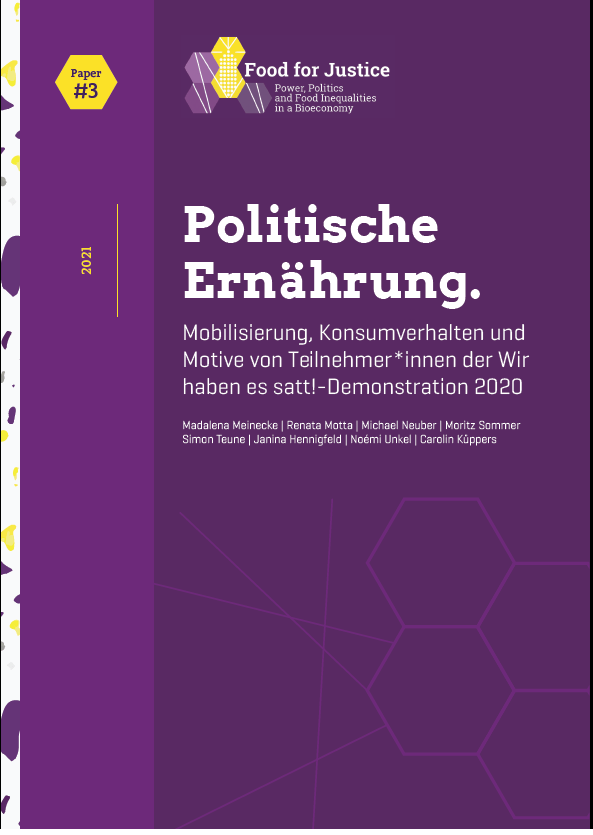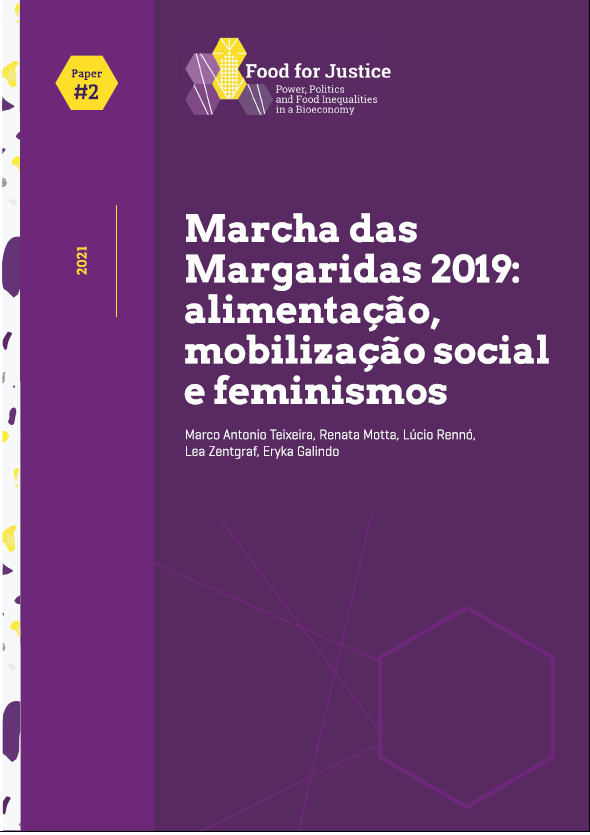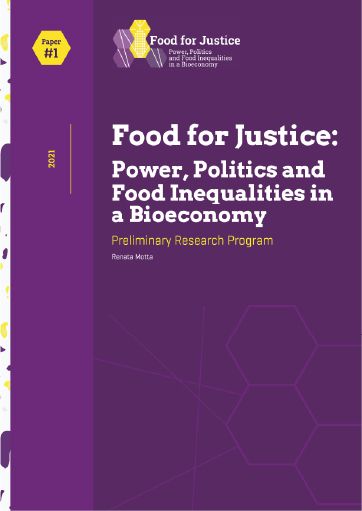Working Paper 3 • 2021
Politische Ernährung. Mobilisierung, Konsumverhalten und Motive von Teilnehmer*innen der Wir haben es satt! Demonstration 2020
Abstract
Die von dem Bündnis Meine Landwirtschaft organisierte Großdemonstration Wir haben es satt! findet seit zehn Jahren zum Auftakt der Agrarmesse Grüne Woche in Berlin statt. Das Bündnis setzt sich für eine nachhaltige, faire Landwirtschaft und Lebensmittelproduktion ein und unterstützt deutschlandweit bäuerliche Betriebe. Am 18. Januar 2020 haben Forscherinnen der Freien Universität Berlin in Kooperation mit dem Institut für Protest- und Bewegungsforschung eine umfassende Befragung der Beteiligten der Wir haben es satt!-Demonstration durchgeführt. Die so gewonnenen Daten geben Aufschluss darüber, wer die Demonstrant*innen waren, was ihre Anliegen und politischen Haltungen sind und, nicht zuletzt, wie sie durch ihr eigenes Verhalten in Konsum und Lebensführung eine andere Landwirtschaft unterstützen. Ein Großteil der Befragten der Wir haben es satt!-Demonstration identifizierte sich als weiblich und ordnete sich politisch als links der Mitte ein. Ältere Kohorten waren insgesamt etwas stärker vertreten. Wie bei vielen Protesten in Deutschland stellen die Befragten einen spezifischen sozio-ökonomischen Ausschnitt der Bevölkerung dar: zwei Drittel geben an, einen Universitätsabschluss zu haben, die meisten verfügen über ein mittleres bis hohes Einkommen. Vor allem waren die Demonstrant*innen stark politisch engagiert; viele von ihnen sind Mitglied in politischen Organisationen, sehr erfahrene Demonstrant*innen und vertraut mit den gesellschaftspolitischen Kämpfen zu Klima- und Umweltpolitik. Für weniger als zwei Prozent war dies die erste Demonstration überhaupt. Da es bei der Demonstrationsbefragung nicht möglich war, auch den an die Wir haben es satt!-Demonstration angegliederten Traktoren-Umzug fußläufi g zu befragen, handelt es sich zudem bei den Teilnehmer*innen der Befragung vor allem um Konsument*innen. Nur sehr wenige der Befragten produzieren selbst Lebensmittel zu kommerziellen Zwecken. Diese spezifische Gesellschaftsgruppe kann als ernährungsbewusst bezeichnet werden. Sie trifft ethische Kaufentscheidungen und hat ein großes Interesse daran hat, die eigenen Anliegen zu äußern.
Working Paper 2 • 2021
Marcha das Margaridas 2019: Food, social mobilisation and feminisms
Abstract
This paper presents the data collected in the survey Marcha das Margaridas 2019: food, social mobilization and gender, whose objective was to understand the social composition and the perception of activists on these issues. The survey was conducted on August 13 and 14, 2019 in face-to-face (458) and self-administered form (1657) modalities. The Marcha das Margaridas is one of the case studies of the Food for Justice Research Group, which analyzes social mobilizations that counter injustices in food systems, as well as social and political innovations that confront multiple and intersectional inequalities such as class, gender, race, ethnicity and nationality, in the construction of just and ecological food systems.
Working Paper 1 • 2021
Food for Justice: Power, Politics, and Food Inequalities in a Bioeconomy Preliminary Research Program
Abstract
The Junior Research Group Food for Justice examines normative questions of inequalities and justice, rights and democracy that arise in disputes surrounding the question “how are we going to feed the world?”. Increasingly, citizens perceive the global food system as part of the historical causes of the ecological crisis and the persisting hunger in the world. Although reasons for these causal links are long known (the use of food for profit, the gap between production and consumption, conflicts over land and water, exploitative labour relations, the energy matrix and waste generation, among others), research on food security and the bioeconomy tend to rely on the same, searching for technological fixes to a profit-oriented model exploiting living matter. What is needed to deepen the debate is more knowledge about which food system citizens desire, which solutions are already there to address the social concerns and how to redirect public policies towards a fair, democratic and sustainable food system. Combining theoretical perspectives on global entangled inequalities with social movement research, Food for Justice will look at challenges and solutions both in Europe (with a focus on Germany) and in Latin America (focusing on Brazil). The research consists of case studies of social mobilization targeting injustices in the food system and case studies of social technologies and political innovations, such as agroecology and alternative food networks. Food for Justice aims at providing a theoretical and conceptual framework, grounded on empirical research, to analyse social and political experimentations that address inequalities based on class, gender, race, ethnicity, rurality, citizenship, thus building fair, democratic and ecological food relations.







